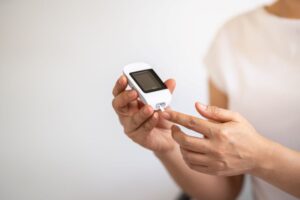
If you are among the millions of people who have been diagnosed with type 2 diabetes, you probably do all you can to make smart food choices and stay physically active. But did you know that the quality of your nightly sleep can also have a huge impact on your diabetes? This blog post discusses the link between sleep apnea and type 2 diabetes.
Sleep Apnea and Hormone Regulation
Obstructive sleep apnea (OSA) is a disorder that causes repeated breathing disruptions during sleep. These episodes, known as apneas, interfere with the sleep cycle and prevent your body from fully benefiting from your nightly shuteye.
One particularly dangerous consequence of OSA is how it can affect your hormones. OSA can cause your blood oxygen levels to decrease, which may in turn lead to an increase in insulin resistance. As a result, you may struggle with elevated blood sugar levels and a higher A1C.
Poor sleep can also affect the hormones that regulate hunger and satiety. After a difficult night, you might be more likely to crave starchy and sugary comfort foods that will spike your blood glucose levels and make it more difficult for your insulin to do its job.
Sleep Apnea and Type 2 Diabetes Are Correlated
According to one statistic published by the American Academy of Sleep Medicine, 7 out of 10 people with type 2 diabetes also have OSA. Why are these conditions so strongly correlated? One reason may have to do with common risk factors. For example, obese individuals are at a heightened risk of both of these conditions. Smoking is another risk factor that these conditions share.
Of course, the connection between poor sleep and type two diabetes may go even deeper. As discussed previously, poor sleep can disrupt insulin function. High blood glucose levels might also have a negative impact on sleep, causing frequent nighttime urination that interferes with the sleep cycle.
What You Can Do
Prioritizing sleep may do much to help you manage your diabetes. Here are a few steps you can take:
- If you have not been diagnosed with OSA, talk to your doctor to find out if you should be tested.
- If you find out that you have OSA, start treatment as soon as you can. Many people have found success with a custom oral appliance from a sleep dentist.
- Take other measures to protect your sleep. For example, you should have a consistent bedtime, avoid the overconsumption of caffeine, and maintain a comfortable sleep environment.
As you become more focused on getting high-quality sleep, you might just find that your diabetes is easier to control and that your overall health takes a turn for the better!
Meet the Sleep Apnea Experts
At Healthy Sleep in Tulsa, our team is led by three talented sleep dentists: Drs. Lori Hare, Billie Reeder, and Robin Ross. They are passionate about supporting our patients’ health, and they are proud to offer convenient oral appliance therapy for individuals with OSA. To learn more about how they and our team may be able to serve you, contact our office at 918-300-4325.
